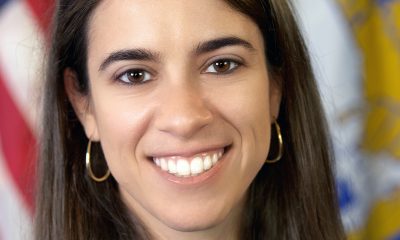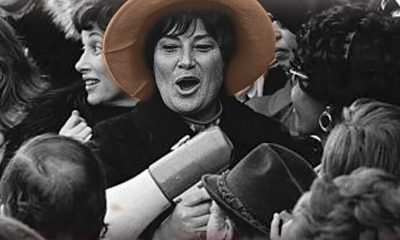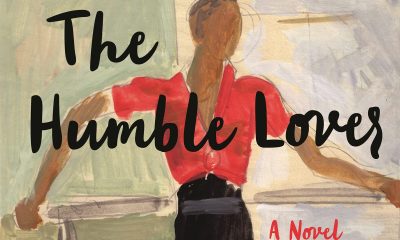News
Christian Union perpetuates culture of homophobia at elite universities
Matt Bennet founded organization in 2002
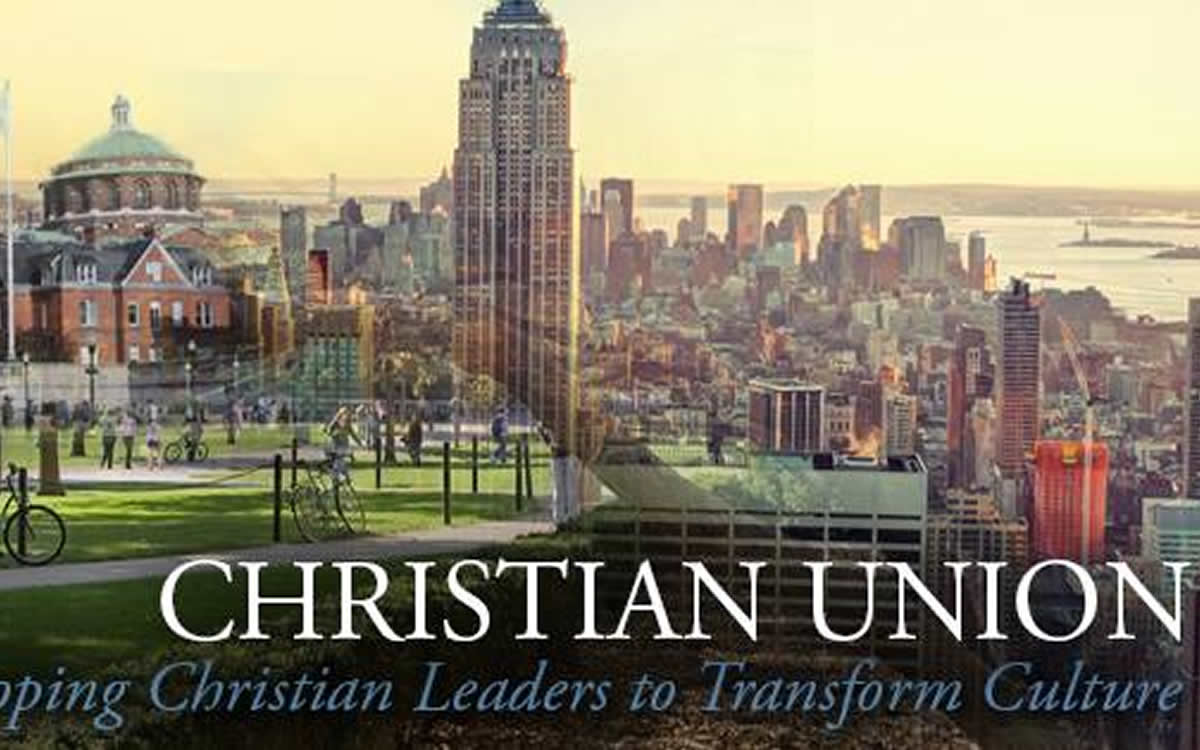
The Christian Union was founded in 2002 by CEO Matt Bennet to fight what he saw as the secularization of top universities and to raise up a generation of global leaders with Christian values. Since it established its first ministry program at Princeton University in 2002, Christian Union has established chapters at all eight Ivy League Schools, as well as at Stanford University and Harvard Law School.
To most onlookers, the Christian Union appears to be a relatively benign presence on these campuses.
Christian Union’s Dartmouth College chapter, for example, until the middle of last year made waffles late on Friday nights to give to students walking home from Frat Row, and these “Christian waffles” made the group somewhat of a hit among the college’s partying community. Dartmouth Christian Waffles, which now operates independently of Christian Union, now makes the waffles.
Behind the Christian Union’s friendly aesthetic and glossy promotional materials, however, there is a sinister and well documented history of homophobia, and queer student members have felt the consequences of the organization’s fundamentalist approach to sex and sexuality.
In the wake of the 2015 U.S. Supreme Court decision legalizing same-sex marriage, the Christian Union Magazine published an article titled “After Obergefell: What Can the Church do?”, describing the ruling as “egregious” and calling on the church to reach out to “those with same-sex attraction and gender identity confusion” and help them form a “Biblical view of themselves.” Under all of the coded religious language, this means, at worst, praying the gay away, and at best, celibacy.
On July 21, 2016, the Christian Union Magazine published an article titled “Christianity Can’t Be Stretched to Endorse Homosexuality,” directly in the wake of the Pulse nightclub massacre in Orlando, Fla. Instead of mourning this instance of extreme violence against the LGBTQ community, the article launched into a defense of the organization’s non-affirming theology, arguing that a true Christian could never accept “gay sexual practices” while remaining faithful to the Bible.
This article is one of many on the topic of what the Christian Union calls “same-sex attraction” — even that phrase robs queer people of humanity and minimizes what it means to be gay — and all are available on Christian Union’s website for the world to see. However, the Christian Union is first and foremost an organization that engages with college students, and to understand the human impact of their fundamentalist theology, the Washington Blade reached out to several current and former Christian Union members about their experiences with the group.
Darby Aono, who graduated from Yale University in 2017, became involved in Yale Christian Union at the end of her freshman year. She was invited to the group by a friend from her dorm, and Aono’s interactions with the first ministry fellow she met were overwhelmingly positive. She continued to get involved with Christian Union, including joining a Bible study later that year.
“I was at Yale over the summer, and I was invited to their Bible study, so I started going to that. There were definitely suspicious things — not about queer stuff, yet — but at that time they did not have women in leadership roles, and it was understood that were would not be,” Aono said.
Valentina Fernandez is a current sophomore at Dartmouth College, and she shared that her experience with Christian Union at Dartmouth has been generally positive. But, similarly to Aono’s initial experience at Yale, Dartmouth’s chapter had an off-putting approach to gender.
Fernandez shared that everyone in the group was very welcoming during her first year, and as someone who was raised Christian but wasn’t very knowledgeable about traditions or the Bible, she was mostly there to find community.
“The reason why a lot of [sophomores], particularly girls, are not as involved this year is because apparently a girl can’t be president by herself — she needs to be co-president with a guy. And a lot of us were like, what?! I wish I knew more about that,” Fernandez said.
While the Christian Union’s approach to women in leadership was concerning for both Fernandez and Aono, it was when Aono started to question her own sexuality that more contentious conversations about queer identities started to surface within Yale Christian Union.
“I think it was maybe during my sophomore year, when I was like, oh, like, maybe I’m not straight. And so I would sometimes talk to my friend in my dorm who was in Christian Union, who originally invited me, and we would get into arguments about homosexuality,” Aono said.
“The party line of Christian Union at that time was ‘love the sinner, hate the sin,’ where we all sin, so we aren’t going to excommunicate anyone for feeling same sex attraction, but just don’t act on it. Don’t sin. I would say that was generally how people seemed to feel about it.”
Then, Aono joined a Christian Union book club, where they read Wesley Hill’s book “Washed and Waiting,” in which Hill advocates for gay Christians to live celibate.
“I don’t want to speak for everyone, but I will say I personally joined the book club because I knew I was queer,” Aono said. “A large part of the discussion was about how to acknowledge the fact that you experience same-sex attraction without acting on it.”
Aono described reading Bible passages in the book club about being gay alongside other passages about being a drunkard or a thief, and feeling a sense of deep incongruity between the two.
“I remember being in the book club and being like: Being gay just is categorically different than stealing. I don’t understand why those two things are listed together,” Aono said.
However, one of the most pivotal conversations about being queer during Aono’s time with the Christian Union happened in the wake of the Obergefell ruling. After seeing the articles Christian Union was publishing about homosexuality after the ruling, Aono reached out to Christian Union via email, asking them to stop spreading incorrect and harmful messages. This email is what got her a meeting with Chris Matthews, the ministry director of Yale Christian Union at the time.
“Somehow, the ministry director figured out that I had sent this email. And so eventually we ended up deciding to have a meeting. At first, we were just arguing about whether you could change the fact that you were gay. At some point, I basically came out to him as queer,” Aono recalled. “And he said, ‘I understand how you’re feeling, because when I was a teenager, I used to have sexual feelings towards office supplies, but I grew out of that.’ I didn’t even know what to say in response to that. I didn’t fight him, because I think I was too shellshocked.”
“I remember walking out of there and then having to go to a ‘welcome the freshmen to Christian Union’ event. And I was like, I don’t know how I’m supposed to go welcome some fucking freshmen after this,” Aono said.
While comparing being queer to being attracted to office supplies is a truly unique instance, moments of casual — and non-casual — homophobia are all too common in the Christian Union. This doesn’t mean that students don’t find meaningful community in the group, or that all of its members are non-affirming of queer people, but the organization itself has a long track record of unsupportive and sometimes outright discriminatory practices.
Harvard University’s chapter of Christian Union, called Harvard College Faith and Action, ignited controversy in 2018 for forcing a student leader to step down after finding out that she was in a celibate same-sex relationship. This led to HCFA being put on probation for violating the university’s anti-discrimination policies for student organizations, only to be re-recognized a year later, despite failing to disaffiliate from Christian Union as the college had required.
A recent Harvard graduate and former member of HCFA, who asked to remain anonymous due to privacy concerns, recalled being caught off guard by how non-affirming the organization was.
“I became interested in HCFA because of some racial justice work that they were doing,” they said. “I didn’t expect them to be fully affirming. I didn’t realize quite how bad it would be.”
A few months after HCFA pressured the student leader to step down for being in a same sex relationship, they again stirred controversy by inviting writer and self-identifying former lesbian Jackie Hill-Perry to Harvard to speak with Christian Union in February 2018. While HCFA characterized this as an “internal” event, Hill-Perry’s presence on campus drew attention, and protesters bearing rainbow flags showed up to the event.
Princeton University’s chapter of Christian Union had also hosted Jackie Hill-Perry in February 2017, so the practice of Christian Union paying a self-identified “speaker to preach on the sins of homosexuality was nothing new.”
The recent Harvard graduate, who attended Hill-Perry’s Harvard speech, recalled the event and HCFA’s efforts to re-characterize it as an internal, scriptural conversation instead of an anti-gay public forum.
“It was very much spun as, she’s going to talk about Jesus in the Garden of Gethsemane before he decided to sacrifice himself,” the graduate said. “The HCFA kept pushing the idea that this was going to be about this particular Bible story, which is a very important Bible story amongst Christians. Now, she did preach on that — and there was no program given before — but she very much preached on the immorality of same-sex relationships and how you can overcome same-sex attraction.”
Unlike Aono, who ended up talking with Yale Christian Union leadership about her concerns, the anonymous Harvard graduate recalled generally being ignored by HCFA leadership.
“I never got any meeting with any leadership. No one was pulling me into their office — I think they were just hoping I’d shut up,” they said.
Like this former Harvard student, the Blade also had trouble getting a meeting with Christian Union leadership. Almost everyone to whom the Blade reached out to for this article declined to comment.
Don Weiss and Noah Crane, ministry directors at Harvard and Dartmouth, respectively, both declined requests for an interview. Multiple Dartmouth students who are or were Christian Union student leaders, and neither the communications staff of Christian Union nor Tyler Parker ever responded to multiple requests for comment.
“I imagine a lot of people don’t want to talk to you because they were so incredibly damaged. I have no regrets — I’m glad that I brought this up because I have no idea if other people would have,” said the Harvard graduate. “I’m glad that people know that HCFA can be so harmful.”
District of Columbia
Little Gay Pub to host April 25 celebration of life for Patrick Shaw
School teacher, D.C. resident praised for ‘warmth, humor, kindness’
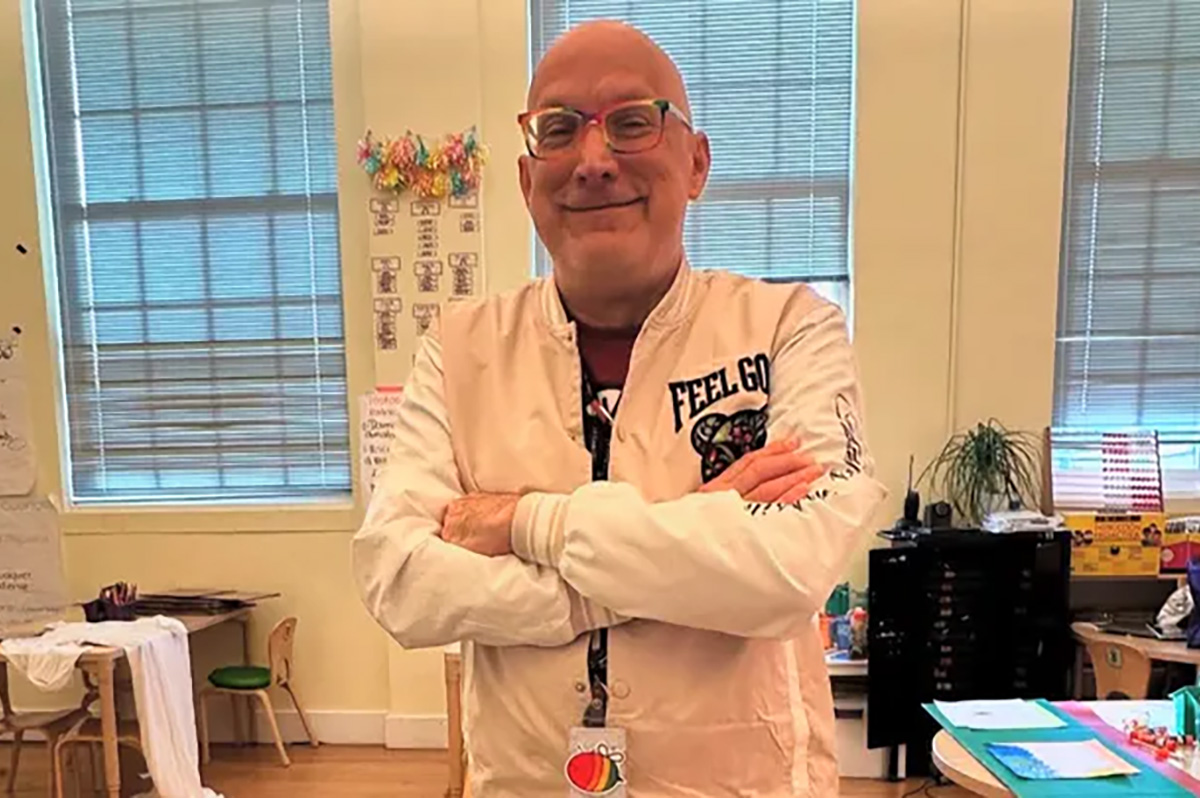
Co-workers and friends will hold a celebration of life for highly acclaimed schoolteacher and D.C. resident Patrick Shaw beginning at 5:30 p.m. Friday, April 25 at The Little Gay Pub 1100 P St., N.W.
Little Gay Pub co-owner and Shaw’s friend, Dusty Martinez, said Shaw passed away unexpectedly on April 19 from a heart related ailment at the age of 60.
“Patrick touched so many lives with his warmth, humor, kindness, and unmistakable spark,” Martinez said. “He was a truly special soul – funny, vibrant, sassy, and full of life and we are heartbroken by his loss.”
In an Instagram posting, Shaw’s colleagues said Shaw was a second-grade special education teacher at the J.F. Cook campus of D.C.’s Mundo Verde Bilingual Public Charter School.
“Patrick brought warmth, joy, and deep commitment to Mundo Verde,” his colleagues said in their posting. “His daily Broadway sing-alongs, vibrant outfits, and genuine love for his students filled our community with energy and laughter.”
The posted message adds, “Patrick was more than a teacher; he was a light in our school, inspiring us all to show up with heart, humor, and kindness every day. His spirit will be deeply missed.”
The Washington Blade is preparing a full obituary on Patrick Shaw to be published soon.
Kenya
Kenya Red Cross-owned hotel to host anti-LGBTQ conference
Speakers from US, European countries to participate in May 12-17 gathering

Plans to host a family values meeting next month in a 5-star hotel in Nairobi that the Kenya Red Cross Society co-owns have sparked an uproar among local queer rights groups.
The groups accuse the Kenya Red Cross of violating its Global Fund commitment of protecting key populations by allowing its Boma Hotel to host an “anti-gender and anti-LGBTQ” conference.
Influential guest speakers from the U.S., the Netherlands, Spain, and Poland will preside over the Pan-African Conference on Family Values that will take place from May 12-17. The Kenyan advocacy groups say these speakers’ organizations are globally recognized for undermining LGBTQ rights.
“As the principal recipient of Global Fund in Kenya, hosting this event contradicts (the) Red Cross’s humanitarian mission and threatens the safety and dignity of people living with HIV, women and LGBTQ+ individuals, the communities that Kenya Red Cross Society has long committed to supporting,” the queer rights groups state.
The LGBTQ groups that have criticized the Kenya Red Cross include Upinde Advocates for Inclusion, the Initiative for Equality and Non-Discrimination, and Gay and Lesbian Coalition of Kenya. They have also launched an online signature collection drive to compel the Kenya Red Cross to withdraw the hotel from hosting the “Promoting and Protecting Family Values in Challenging Times”-themed conference.
“The event’s so-called ‘family values’ narrative is a smokescreen for policies that push hateful legislation and promote death, discrimination, femicide, gender-based violence, and restrict fundamental freedoms across Africa,” the groups said.
The pro-life Western organizations that are scheduled to participate in the conference include Family Watch International from the U.S., CitizenGo from Spain, the Ordo Luris Institute from Poland, Christian Council International from the Netherlands, the New York-based Center for Family and Human Rights (C-FAM), and the Foundation for American Cultural Heritage. Their local counterparts include the National Council of Churches of Kenya, the Kenya Christian Professionals Forum, the Africa Christian Professionals Forum, and the Evangelical Alliance of Kenya.
C-FAM President Austin Ruse; Family Research Council Vice President for Policy and Government Affairs Travis Wever; Global Life Campaign Executive Director Thomas W. Jacobson; and the Rev. Ricky Chelette, executive director of Living Hope Ministries, Inc., and president of the Institute of Biblical Sexuality are among the U.S. guest speakers. Other participants include Henk Jan van Schthorst, president of Christian Council International’s board of directors, Ordo Luris Institute President Jerzy Kwasniewskie and his colleague, Rafal Dorosinski, director of the group’s Legal Analysis Center.
The Kenyan groups through their online petition — “Tell Red Cross Kenya Not to Give Hate a Platform” — has so far raised more than 1,000 of the 10,000 signatures they hope to collect. The petition is addressed to Red Cross Kenya Secretary-General Ahmed Idris and his predecessor, Abbas Gullet, who is the hotel’s director.
“We call on you to immediately cancel this booking and publicly reaffirm Red Cross’ commitment to human rights, health and inclusivity,” the petition reads. “Failure to act will raise concerns about whether (the) Red Cross can still be trusted by the community to lead with empathy and fight for their rights.”
The Kenya Red Cross, however, maintains the Boma Hotel is a separate entity, even though public records indicate it is one of the facility’s shareholders.
The LGBTQ groups note the hotel should be a safe space that promotes inclusion, not platforms that enable “harmful gathering” for hate and exclusion by “dangerous groups.”
“By providing a venue for this event, Red Cross directly enables a platform for hate and discrimination — a stark contradiction to the values of inclusivity, humanity, and nondiscrimination that the organization claims to uphold,” they said.
The organizations further warn that proceeding to host the conference threatens the relationship between the Red Cross and the marginalized communities who have long depended on the humanitarian organization for support and protection. CitizenGo has nonetheless criticized the LGBTQ groups, which it describes as “radical activist groups” for “trying to silence a pro-family event” and asked the Kenya Red Cross and the Boma Hotel not to back down.
“These groups are calling the event ‘hateful’ because it affirms the natural family — marriage between a man and a woman — and the dignity of every human life, including the unborn,” Ann Kioko, the group’s campaign director for Africa and the U.N., said.
Through an online counter signature collection drive, Kioko holds CitizenGo and other groups won’t be intimidated, silenced or apologize to the queer rights groups for defending “our families, our faith and our future”.
“The real goal of these foreign-funded activist groups is to impose LGBTQ and gender ideologies on Africa — ideologies that have led elsewhere to the confusion of children, the breakdown of family structures and the rise of sexual libertinism that results in abortion, STIs and lifelong emotional and psychological trauma,” Kioko stated.
India
Opposition from religious groups prompts Indian Pride group to cancel annual parade
Event was to have taken place in Amritsar on April 27

Pride Amritsar, a student-led organization in the Indian state of Punjab, earlier this month announced the cancellation of its Pride parade that was scheduled to take place on April 27, citing opposition from certain religious groups.
The event, planned for the Rose Garden in Amritsar, a city revered as a spiritual center of Sikhism, had faced mounting resistance from Sikh religious organizations, including the Nihang Singh faction and the Akal Takht, the faith’s highest temporal authority. These groups labeled the parade as “unnatural” and urged local authorities to deny permission, citing its potential to disrupt the city’s religious sanctity.
In an Instagram post on April 6, Pride Amritsar organizers Ridham Chadha and Ramit Seth elaborated on its mission and the reasons for the cancellation.
“Since 2019, we have organized peaceful parades and celebrations in Amritsar to connect and uplift the LGBTQIA+ community, with a particular focus on transgender individuals and their rights,” their statement read.
Chadha and Seth highlighted Pride Amritsar efforts in providing guidance, counseling, and job opportunities, which have been met with positive responses. However, due to opposition this year, Pride Amritsar announced the cancellation of the 2025 parade.
“We have no intention of harming the sentiments of any religious or political groups,” the statement read. “The safety of our members is our top priority, and we will take all necessary measures to ensure their protection.”
Chadha and Seth spoke with the Washington Blade about their decision to cancel the parade.
They explained that resistance came from both religious and political groups who labeled the parade and its values as anti-Sikh and contrary to Punjabi and Indian cultural norms. Critics specifically objected to the event’s location in Amritsar, a city regarded as a sacred center of Sikhism, arguing that the parade would disrupt its spiritual purity.
Chadha and Seth stressed Pride Amritsar lacks political, financial, or legal support. Composed of students and young professionals, the group organizes the parade biennially, dedicating personal time to advocate for the LGBTQ community.
“We do it independently, crowdfund the parade and cover the rest with our pockets,” said Seth and Chadha.
When asked by the Blade why Pride Amritsar did not approach the High Court or local authorities to protect the parade, despite the Supreme Court’s 2018 ruling that decriminalized consensual same-sex sexual relations, Chadha and Seth cited significant barriers.
“Pursuing legal action in India requires substantial resources, both financial and temporal,” they explained.
Chadha and Seth also noted that such action could lead to public shaming and unwanted publicity for participants, potentially harming their careers in Amritsar. They therefore chose not to pursue legal recourse.
Chadha and Seth said Pride Amritsar does not have any plans to hold alternative events.
“We are still exploring options, but we are likely not holding any events this year,” they said, citing significant harassment that organizers faced and the need for time to plan how to best serve the local LGBTQ community moving forward.
“Our evaluation of what the biggest challenge is has changed after this year,” said Chadha and Seth to the Washington Blade. “The biggest challenge, by far, seems to be education. We need to educate the community about what the community is, does, and why it exists. Why we do parades. Why we dance. Why calling someone ‘chakka’ is harmful. How we actually fit into religion and fall within the guidelines.”
Chadha and Seth said organizing the parade in Amritsar since 2019 has been an uplifting experience, despite continued opposition.
“The moment you join the parade, chant a slogan, or sing a song, it’s transformative,” they said. “Fear vanishes, and a sense of freedom takes over.”
The cancellation of the 2025 Amritsar Pride Parade has sparked concerns among activists in Punjab, as the Indian Express reported.
The Punjab LGBT Alliance and other groups expressed concern that the decision to cancel the parade may strengthen opposition to future LGBTQ-specific events.
-

 Federal Government2 days ago
Federal Government2 days agoHHS to retire 988 crisis lifeline for LGBTQ youth
-

 Opinions2 days ago
Opinions2 days agoDavid Hogg’s arrogant, self-indulgent stunt
-

 District of Columbia1 day ago
District of Columbia1 day agoD.C. police seek help in identifying suspect in anti-gay threats case
-

 Opinions1 day ago
Opinions1 day agoOn Pope Francis, Opus Dei and ongoing religious intolerance

